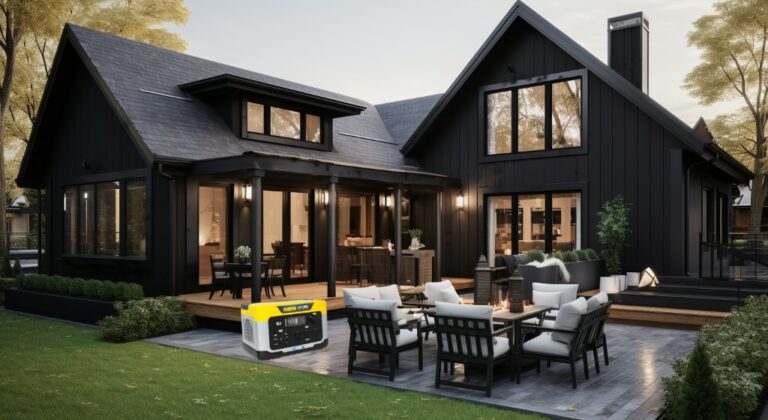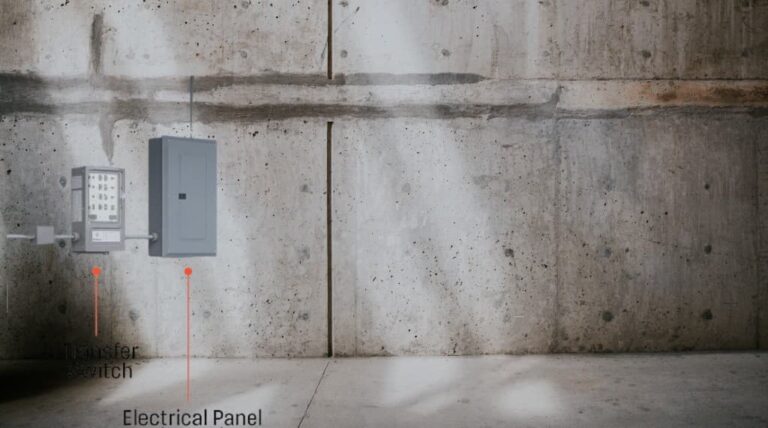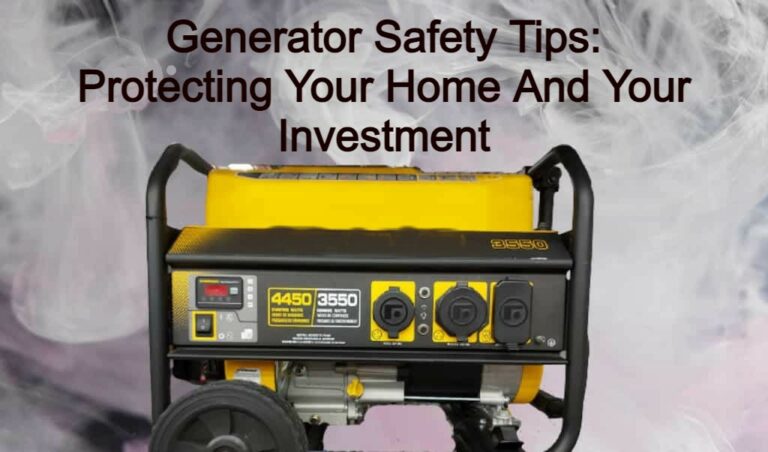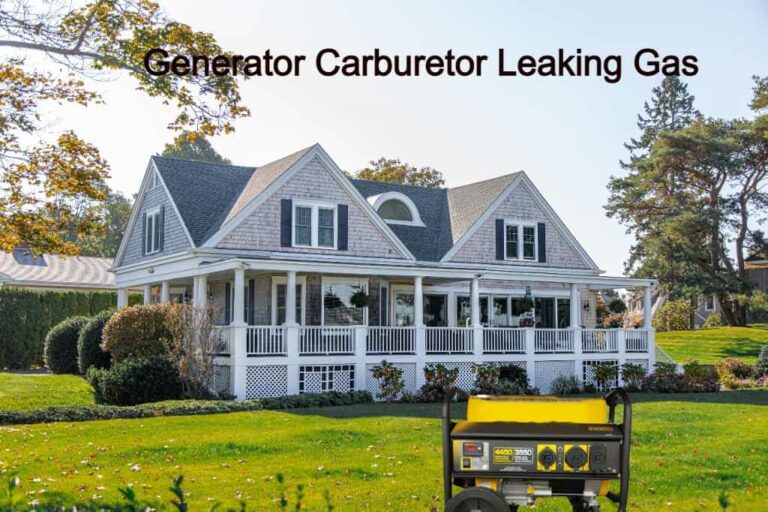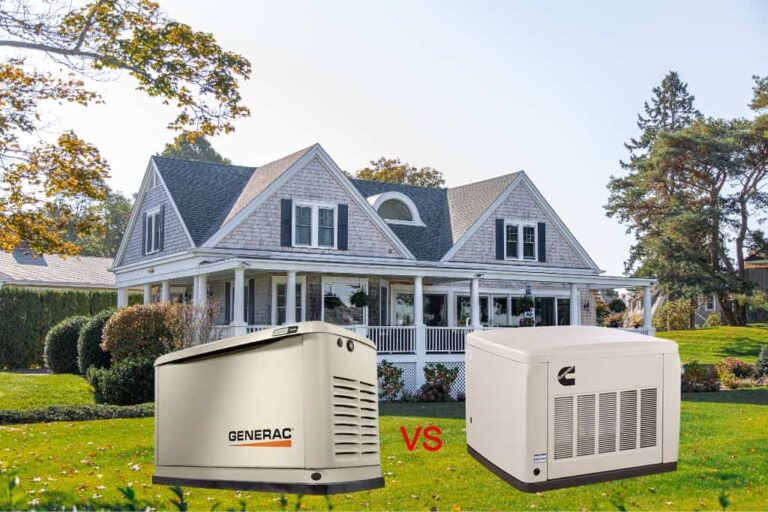How Far Should a Generator Be From the House

Wondering how far your generator should be from your house? Let me give you all the important factors to consider when deciding on the ideal distance for your generator.
We’ll cover fire code requirements, manufacturer recommendations, local regulations, and noise levels. I have years of experience in this field so I can offer you actionable advice based on past experiences.
Regarding the distance between your generator and your house, it is crucial to follow safety guidelines. The general rule of thumb is to place the generator at least 15 feet from your house. This ensures proper ventilation and reduces the risk of carbon monoxide buildup. However, always check the requirements in your generator’s manual or consult a professional for guidance.
Additionally, consider the noise level of your generator. Generators can be quite noisy, mainly if you use a portable one. Placing the generator as far away from living areas is recommended to minimize noise disturbances. This could be in a shed, garage, or designated outdoor area.
Professional installation is highly recommended for generators. An expert can assess your specific needs, ensure proper installation, and provide valuable insights on the ideal distance for your generator. They can also help you comply with local regulations and ensure the generator is safely connected to your electrical system.
Having a backup generator can provide peace of mind during power outages. It keeps your family safe and comfortable by providing electricity to essential appliances such as refrigerators, heating systems, and medical equipment. Remember to regularly maintain and test your generator to ensure it is in proper working condition when needed.
In conclusion, the distance between your generator and your house is important for safety and noise reduction. Follow the recommended guidelines, consult professionals, and prioritize the well-being of your family. Stay safe and prepared!
Fire Code Requirements for Standby Generators
Ensure your standby generator meets fire code requirements for the safety of your home and family.
The National Fire Protection Association advises placing the generator at least five feet away from the house to prevent fire hazards. Maintaining a safe distance from windows and doors is also important to keep fumes and exhaust gases out of your home.
Following these guidelines keeps you compliant with fire code regulations and creates a safer environment for everyone.
Prioritize the well-being of your family and neighbors by placing the generator at a safe distance from property lines.
Manufacturers Recommendations and Local Regulations
When placing your generator, following manufacturers’ recommendations is crucial. Most manufacturers advise keeping the generator at least five feet from any occupied building. This not only ensures the safety of your generator but also promotes its efficient operation.
In addition to the manufacturer’s recommendations, it’s important to comply with local codes and regulations. These regulations often dictate a minimum distance between the generator and your house and other structures on your property. By adhering to these codes, you can protect your home and the surrounding area from potential hazards.
To determine the specific requirements for placing your generator, it’s advisable to consult with a professional or contact your local authorities. Their expertise will help you navigate any legal issues and ensure the correct installation of your generator.
Drawing from experience, here are some actionable tips to consider when placing your generator:
- Choose a location that allows for proper ventilation and airflow around the generator. This will prevent overheating and ensure optimal performance.
- Consider the noise levels of your generator. Placing it further away from your home can help minimize noise disturbances.
- Take into account the accessibility of the generator for maintenance and repairs. Ensure that there’s enough space around it for easy servicing.
By taking these steps and carefully considering the manufacturer’s recommendations and local codes, you can confidently position your generator in the safest and most appropriate location.
Choosing the Best Location for Your Generator
Ensuring optimal performance requires careful consideration of exhaust flow and noise levels when selecting the ideal location for your generator. When deciding where to place the generator, it’s crucial to position it at a sufficient distance from your house to minimize potential risks. Placing the generator too close to your home can result in harmful exhaust fumes entering your living space, posing health hazards. Additionally, running the generator can produce loud noise levels, so placing it far away from your home is advisable to minimize disturbances.
Another important factor to consider is the proximity to your neighbor’s homes. Placing the generator too close to their residences can cause noise disturbances and may even violate local noise ordinances. Being considerate of your neighbors is essential, so choose a location far enough from their homes to minimize any inconvenience.
By carefully selecting the best location for your generator, you can ensure safe and efficient operation without causing disruptions to your home or neighbors. Drawing from past experiences and expertise, here are some actionable tips:
- Evaluate the exhaust flow: Ensure the generator is positioned to direct exhaust fumes away from your home and any nearby windows or vents. This can help reduce the risk of harmful fumes entering your living space.
- Assess noise levels: Consider the decibel rating of your generator and choose a location that minimizes noise disturbances for both your household and your neighbors. Placing the generator farther away from living areas can help mitigate noise-related issues.
- Consult local regulations: Research and familiarize yourself with noise ordinances or regulations specific to your area. Understanding these rules will help you select a location that complies with the legal requirements and respects your neighbors’ peace.
- Consider a soundproofing solution: If your generator’s noise levels still pose a concern, explore soundproofing options such as installing noise barriers or enclosures. These can help further reduce noise and minimize disturbances.
Proximity to Fuel Source and Installation Cost
Choosing a location near the gas meter is beneficial for reducing installation costs when connecting the generator to the home’s natural gas supply. Placing the generator close to the gas meter reduces the distance the gas line needs to travel, resulting in lower installation costs. This is especially important for those looking to save money while ensuring a reliable backup power source for their home.
Proximity to the fuel source, in this case, the gas meter, is crucial for efficient operation and easy installation. Having the generator near the gas meter eliminates the need for extensive gas line installations, which can be expensive and time-consuming. It also allows easier access to the fuel source, making maintenance and refueling more convenient.
Considering the installation cost is essential when determining the best location for your generator. Choosing a spot near the gas meter minimizes the distance and complexity of the installation process, ultimately saving you money.
To ensure the generator is conveniently located near the gas meter, it’s important to keep in mind the proximity to the fuel source. This reduces installation costs and makes maintenance and refueling more accessible. Based on my experience and expertise, I recommend consulting with a professional to determine the most suitable location for your generator.
Soil Composition and Flooding Risks
Consider the soil composition and potential flooding risks when choosing the location for your generator. Selecting stable and suitable ground for the generator’s concrete pad is crucial. Not all soil types can support the generator’s weight, so it’s important to evaluate the soil composition before installation.
Additionally, avoid areas prone to flooding when deciding on the generator’s location. Flooding can damage the generator and hinder its functionality. To ensure the longevity and effectiveness of your generator, choose a location less susceptible to flooding.
Consulting with professionals can help assess the property and determine the best location, considering the soil composition and flooding risks. It’s important to find a spot that provides stability and protection for your generator, allowing it to operate optimally and provide the backup power you need for your home.
Tips for Installing a Backup Generator
When installing a backup generator, there are a few important considerations to remember. Start by placing the generator at least five feet away from any property lines to comply with local regulations and ensure the safety of neighboring homes.
It’s also crucial to maintain a distance of 18 inches to 20 feet between the generator and your home, depending on its size and your property. This will prevent fumes from entering your home and protect your family.
Another tip is to keep a minimum of 5 feet between the generator and windows and doors to prevent fumes from seeping into the house. Additionally, if possible, it’s a good idea to position the generator near electric and gas meters for easy access to power sources.
In my experience, it’s essential to store fuel for the generator safely and regularly rotate the emergency supply to ensure its readiness. This proactive approach can save you from last-minute inconveniences during power outages.
Importance of Professional Installation
When it comes to ensuring the safety and efficiency of your backup generator system, it’s crucial to hire a professional for the installation. The well-being of your home and family should never be compromised, so it’s best to leave the installation process to experts in the field.
Professionals have the necessary knowledge and experience to handle the installation optimally, guaranteeing that the generator is placed in the best location. A professional installation considers important factors such as proximity to the house, carbon monoxide emissions, and compliance with local regulations. By entrusting the installation to professionals, you can have peace of mind knowing that these critical considerations are being addressed. They have the expertise to determine the ideal location for the generator, ensuring its optimal and safe operation.
Moreover, professionals like PowerTech have extensive experience installing generators and can provide valuable insights and advice based on their past experiences. They can offer actionable recommendations specific to your needs, helping you find the best solution for your backup power requirements. This level of expertise and guidance is something you won’t get if you attempt to handle the installation on your own.
Attempting a DIY installation can be risky and may result in improper setup, which can have serious consequences during a power outage. It isn’t worth taking chances when it comes to the safety and well-being of your loved ones. By relying on professionals, you invest in protecting your home and family.
Frequently Asked Questions
What Are the Noise Level Regulations for Generator Placement in North Carolina?
North Carolina’s regulations for generator placement state that the noise level should not exceed 85 decibels when measured from a distance of 10 feet. It is crucial to follow these regulations to ensure a peaceful neighborhood.
To provide you with valuable insights based on our expertise, here are some actionable tips derived from past experiences specific to this topic:
- Opt for a generator with noise reduction features: Consider models designed to minimize noise when selecting a generator. These generators often come with soundproof enclosures or mufflers that significantly reduce noise levels.
- Choose an appropriate location for your generator: Proper generator placement can help minimize noise disturbances. Select a spot away from windows, doors, and neighboring properties. Additionally, consider further reducing noise transmission by using sound barriers such as fences or walls.
- Regular maintenance is critical: Ensuring your generator is well-maintained can help prevent excessive noise levels. Regularly check and service the generator according to the manufacturer’s recommendations to keep it running smoothly and quietly.
- Consider investing in a remote start feature: Some generators have remote start capabilities, allowing you to start and stop the generator from a distance. This feature can be particularly beneficial in reducing noise disruptions, as you can turn off the generator when it’s not needed.
By following these tips, you can comply with the noise level regulations and contribute to a more peaceful and harmonious community. Remember, being mindful of your generator’s noise output is essential for fostering a pleasant neighborhood environment.
Make sure to read the last update in regulations.
How Far Should the Generator Be From Neighboring Houses to Comply With Local Noise Ordinances?
To comply with local noise ordinances, it is advisable to position the generator at a safe distance from neighboring houses. This ensures minimal disruption and promotes a sense of community integration.
It is best to use clear and concise language for optimal communication, ensuring that the average reader can easily understand the information provided. Additionally, sentences should be structured in a way that flows smoothly and is easily digestible.
With years of experience and expertise in this field, we have found that placing the generator at least 50 feet away from neighboring houses is a recommended distance. This allows for a sufficient buffer zone, reducing noise levels and minimizing potential disturbances.
Based on our past experiences, we offer the following actionable advice specific to this topic. Firstly, it is crucial to consider the layout of the surrounding area and the direction of prevailing winds. Placing the generator on the opposite side of the prevailing winds can help further reduce noise transmission to neighboring houses.
Secondly, investing in soundproofing measures can significantly enhance the effectiveness of noise reduction. Installing sound barriers, such as acoustic fences or walls, can significantly dampen the sound waves emitted by the generator.
Lastly, regular maintenance and proper generator installation can reduce noise. Ensuring the generator is properly aligned in good working condition can minimize unnecessary vibrations and noise.
What Are the Benefits of Having a Backup Generator During Power Outages?
Backup generators are a valuable resource during power outages as they provide essential appliances like refrigerators, heating, air conditioning, warm water, and the ability to prepare meals. This not only ensures the comfort and safety of my family but also offers a sense of security during unforeseen circumstances.
Having personally experienced power outages, I can attest to the benefits of having a backup generator. When the lights go out, it can be a disorienting and inconvenient. However, with a backup generator, I know that my family and I can continue our daily routines without disruption.
One actionable piece of advice I can offer based on my past experiences is to make sure the backup generator is properly maintained and regularly serviced. This ensures its optimal performance and longevity, so it will be reliable when needed the most. Additionally, it is important to have a sufficient fuel supply to power the generator for an extended period if necessary.
During a power outage, the absence of electricity can impact various aspects of daily life. For example, perishable food items stored in the refrigerator without a backup generator can spoil, leading to food waste and potential health risks. Furthermore, the lack of heating or air conditioning can make extreme weather conditions unbearable, jeopardizing the well-being of family members, especially children and the elderly.
A backup generator also provides the convenience of warm water for bathing and washing dishes. This may seem like a small luxury, but it significantly contributes to maintaining personal hygiene and cleanliness during a power outage.
What Are the Potential Risks of Installing a Generator in an Area Prone to Flooding?
Installing a generator in an area prone to flooding carries certain risks. It’s important to keep in mind that flooding can cause damage to the generator and create safety hazards. Seeking professional guidance is essential to ensure proper installation and protection.
To provide valuable advice based on past experience, here are some additional points to consider:
- Opt for elevated installation: When installing a generator in a flood-prone area, it’s advisable to elevate it above the anticipated flood level. This can help protect the generator from water damage and ensure its functionality during and after a flood.
- Use flood-resistant equipment: Consider using flood-resistant generators that are specifically designed to withstand water exposure. These generators are equipped with features like waterproof housing and elevated electrical components, reducing the risk of damage during flooding.
- Secure the generator properly: Ensure that the generator is securely anchored or mounted to prevent it from being swept away by floodwaters. Use appropriate straps or brackets to keep it in place and minimize the risk of displacement.
- Regular maintenance and inspections: Schedule regular maintenance and inspections for your generator to detect any potential issues or vulnerabilities. This proactive approach can help identify and address any concerns before they escalate, ensuring the generator’s reliability during flood events.
- Invest in flood insurance: Protect your investment by obtaining flood insurance coverage specifically tailored for generators. This can provide financial assistance in the event of flood-related damages that may not be covered by standard insurance policies.
Why Is It Important to Have Professional Installation for a Backup Generator?
Why Professional Installation for a Backup Generator is Important
Professional installation for a backup generator is vital because experts ensure optimal and safe operation. They have extensive experience in finding the best location and can provide a support line during emergencies. Moreover, their expertise and knowledge guarantee a smooth and efficient installation process.
When it comes to backup generator installation, it can be a daunting task for the untrained individual. By hiring professionals, you can save yourself the hassle and potential risks associated with improper installation. These experts have a deep understanding of the electrical system and can navigate through any challenges that may arise.
Not only do professionals have the necessary experience, but they also offer valuable advice based on their past installations. They can recommend the perfect generator size and type for your specific needs, ensuring that you have sufficient power during outages. Additionally, they can provide actionable advice on maintenance and troubleshooting, helping you avoid potential issues in the future.
By enlisting the help of professionals, you can be confident that the backup generator will be installed correctly, following all safety regulations and guidelines. They will carefully assess your property and determine the best location for the generator, taking into account factors such as noise level, accessibility, and ventilation.
Furthermore, professional installation provides peace of mind during emergencies. These experts can establish a support line, offering assistance and guidance when you need it the most. Knowing that there is a reliable team to rely on in critical situations can alleviate stress and ensure a quick resolution to any generator-related problems.
Read about Preventing Water In Your Generator’s Fuel Tank
Conclusion
When determining the distance between a generator and your house, it’s important to consider several factors. These include fire code requirements, manufacturer recommendations, and local regulations. You should also take into account factors such as exhaust flow, noise levels, and proximity to neighbors’ homes.
For optimal safety and functionality, it’s highly recommended to have a professional installation. They have the expertise and experience to ensure the generator is placed in the best location.
At PowerTech, we have years of experience in providing reliable generator solutions for homes. Our team can assist you in finding the perfect generator for your specific needs.
